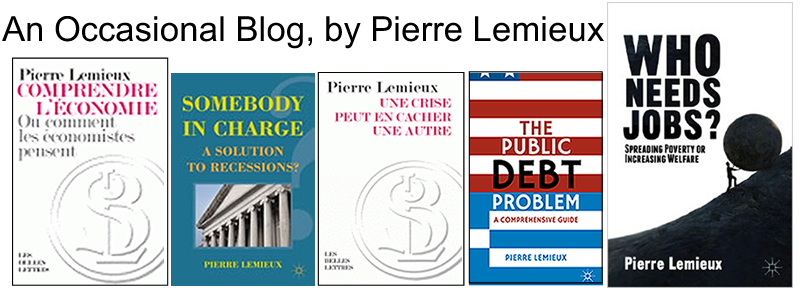Welfare economics, which was developed from the 1930s on (by Hicks, Kaldor, Samuelson…), was once a major field of economic theory, but now seems absent from academic curricula – except perhaps in its offshoot of cost-benefit analysis and in the parallel field of social choice theory (Arrow, Sen…). Welfare economists were interested in developing criteria for government intervention in case of market failure, which they saw everywhere. However, the main conclusion of welfare economics was finally that there is no purely scientific criteria, only moral ones – that is, criteria imposed by the value judgments of some dictator or politically dominant group. On this, see my article “Social Welfare, State Intervention, and Value Judgments,” The Independent Review 11(1) (Summer 2006), pp. 19-36; and ” One could say that public choice theory (“politics without romance,” as Buchanan said) destroyed welfare economics; from another perspective, that welfare economics sowed the seeds of its own irrelevance. See “The Vacuity of the Political ‘We’,” Library of Economics and Liberty, October 6, 2014. Yet, proving that government intervention and redistribution cannot be based on scientific criteria is a crucial result, which would justify bringing welfare economics back to the forefront of academic concerns. Economists (and policy makers) cannot meaningfully talk about public policy without referring to welfare economics.
Tag Archives: economics
An Economist’s Reflections on Aristotle’s Politics
My foreword to the Laissez Faire Books / Classical Wisdom ebook edition of Aristotle’s Politics (2015)
Reviewing Aristotle’s Politics on Amazon, a reader opined, “even though Aristotle’s ideas are brilliant, I don’t like the way he expresses himself.” Everybody can have his opinion, but this one is problematic. First, Aristotle’s Politics, as it has been handed to us, is quite certainly not exactly what Aristotle wrote or said. Moreover, one is advised to approach with some humility a classic book that is still influential after 25 centuries. In this spirit, I will try to provide some keys about how Politics fits in today’s knowledge of politics, economics, and liberty. Continue reading
Urban Legends about Mathematics and Keynes
Many urban legends circulate about the use of mathematics in economics.
For example, many people think (they have heard that…they know somebody who knew somebody who knew…) that John Maynard Keynes loved and used mathematics. In his 1936 magnum opus, The General Theory of Employment, Interest and Money, Keynes seldom used math. He even attacked economists for using them too much. One can find this by simply reading the General Theory:
It is a great fault of symbolic pseudo-mathematical methods of formalizing a system of economic analysis… Continue reading
